Paleo-Friendly, High Fat, Vegan Whip Cream.
This is one of the simplest recipes to make. It's a dairy-free, Paleo-friendly, completely vegan whip cream.
There are exactly 2 ingredients:
- a can of coconut cream;
- and 2 tablespoons of maple syrup.
These 2 ingredients matter quite a bit to the success of this recipe.
Start by chilling a 400 ml or 14 fl oz can of the highest fat coconut cream that you can find.
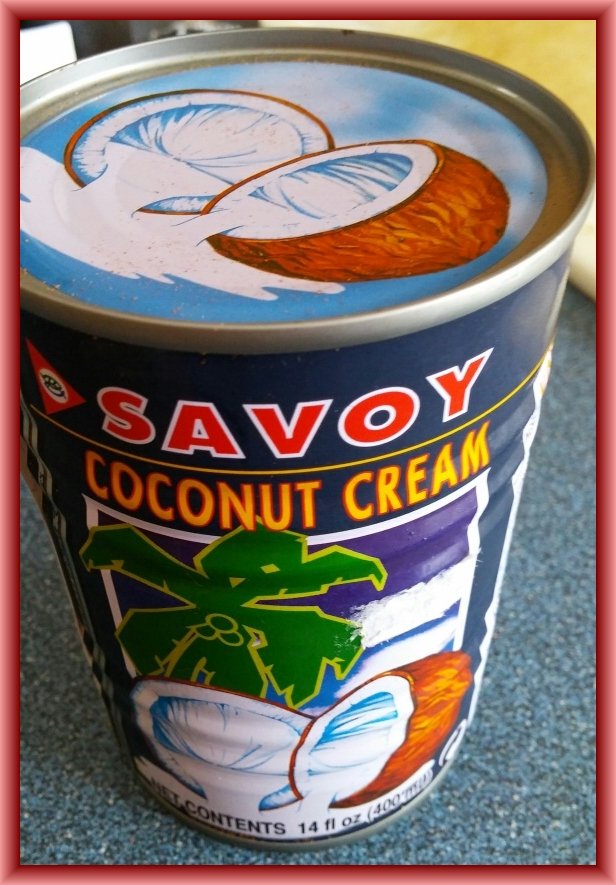
This is one of the brands that I liked to use because of its high fat content.
The can must be really chilled so, I leave a can in my refrigerator for at least 24 hours before I make the whip cream.
This recipe takes under 5 minutes to make so I always keep a few cans of coconut cream in my refrigerator just in case I need to add whipped cream as a filling or a topping to another dish that I am preparing.
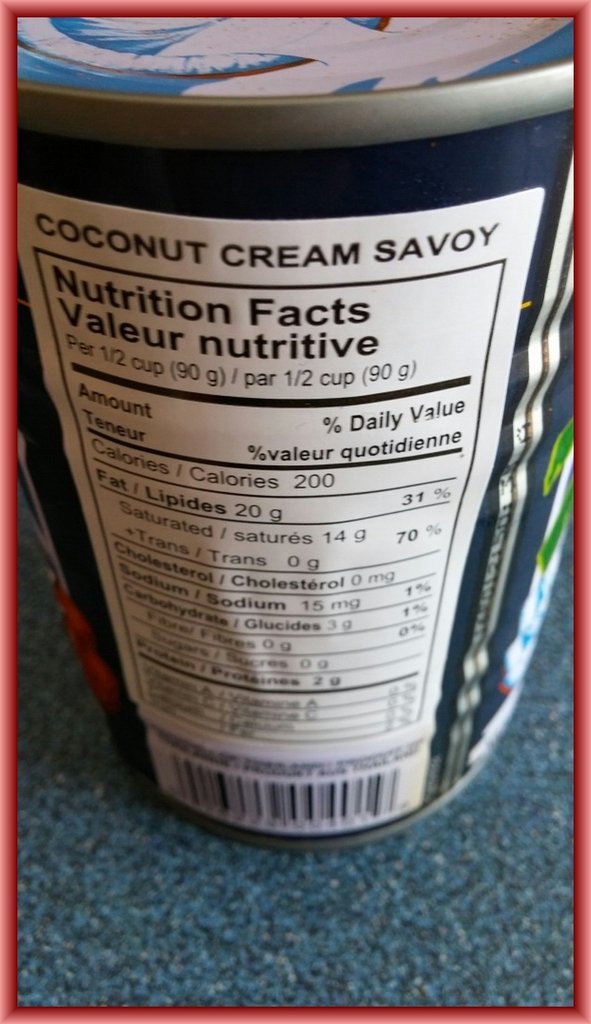
You'll notice that this can contains 20 grams of fat per 1/2 cup serving size. There is just over 4 portions per can which brings the fat content to almost 90 grams of fat per can.
Do not fear fat. Your brain and spinal cord require good quality fat in order to operate efficiently.
In fact, your brain is made of fat.
In my opinion, part of the reason that we are "in trouble" in North America with the rise of diseases like Alzheimer's and different types of Dementia is because we have been conditioned, through media exposure, to eat low fat diets.
This has been the trend for the last 35+ years and we've actually been experiencing a drastic rise in cardiovascular, dementia and obesity related diseases, ever since.
Eating a low fat diet is not correcting these malfunctions and it is my opinion that it is making them worse.
Bring on the fat!
Just don't mix the fat with refined carbohydrates like cane sugar, grains and starches and you will enjoy the benefits that the high fat offers to the body in terms of being an excellent fuel source. (End of nutrition rant.)
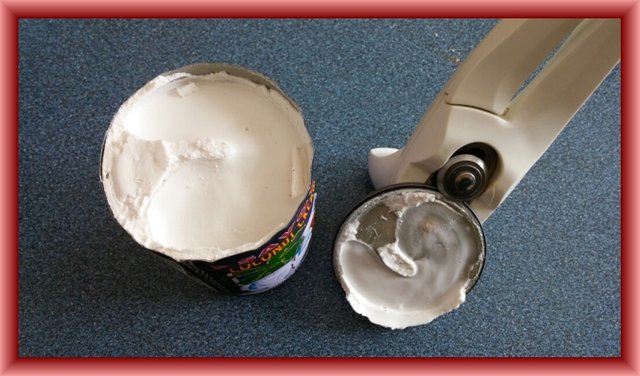
Removing the lid from the can, you can see that the coconut cream forms a solid mass that rises to the top of the can, once it has been thoroughly chilled.
Carefully scoop the cream off the top and put into the mixing bowl of a stand mixer or mixing bowl if you are using a hand mixer.
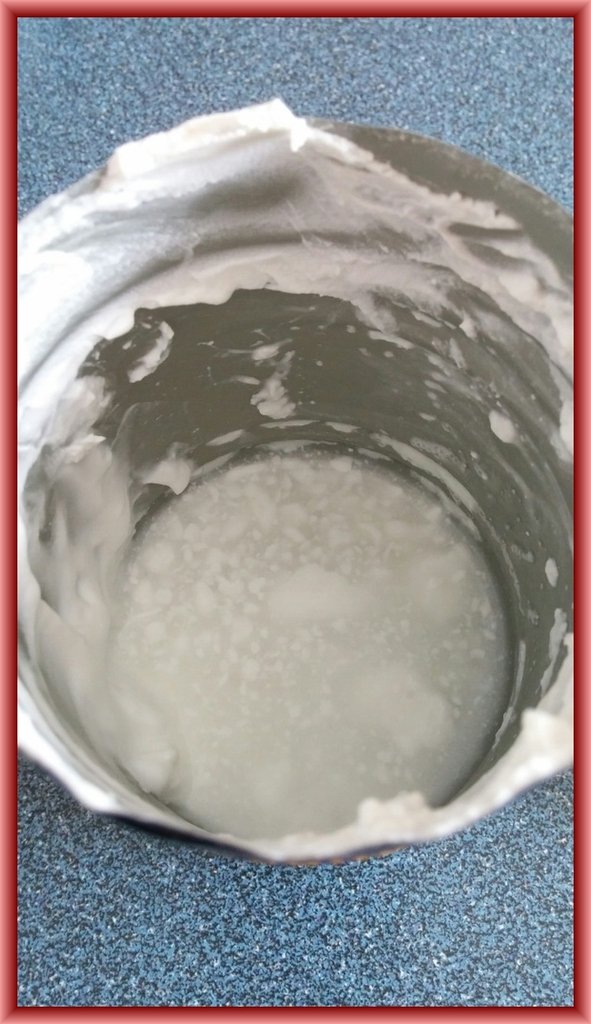
Approximately 1/4 cup of coconut water will be left in the bottom of the can. Keep this water to use in another recipe.

I like to use the whisk attachment with my stand mixer. This is quite a heavy whip cream, so whipping air through it helps to make it fluffier.
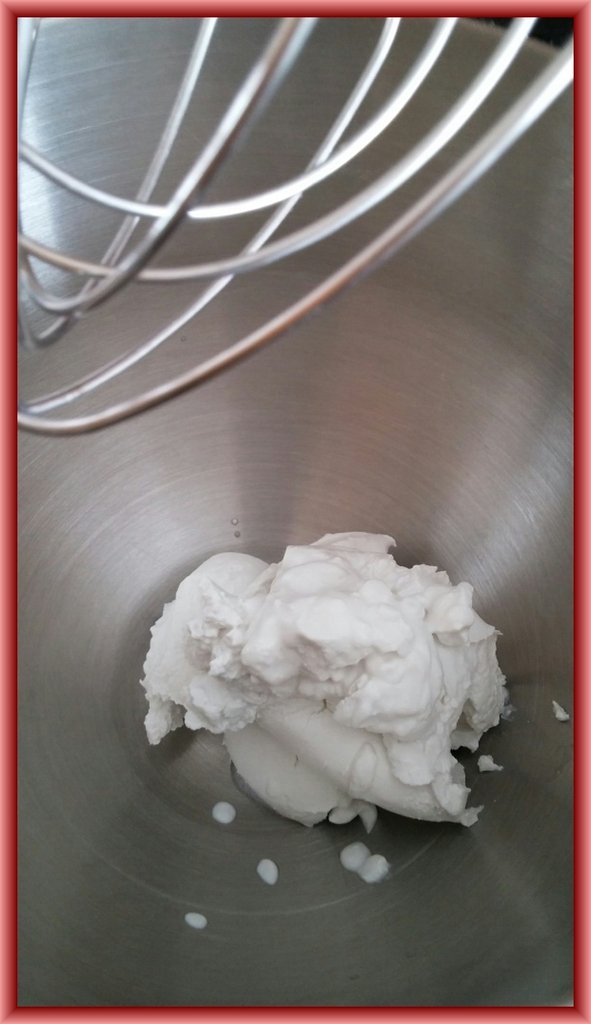
Add the chilled coconut cream to the mixing bowl, then add 2 tbsp of cold maple syrup.
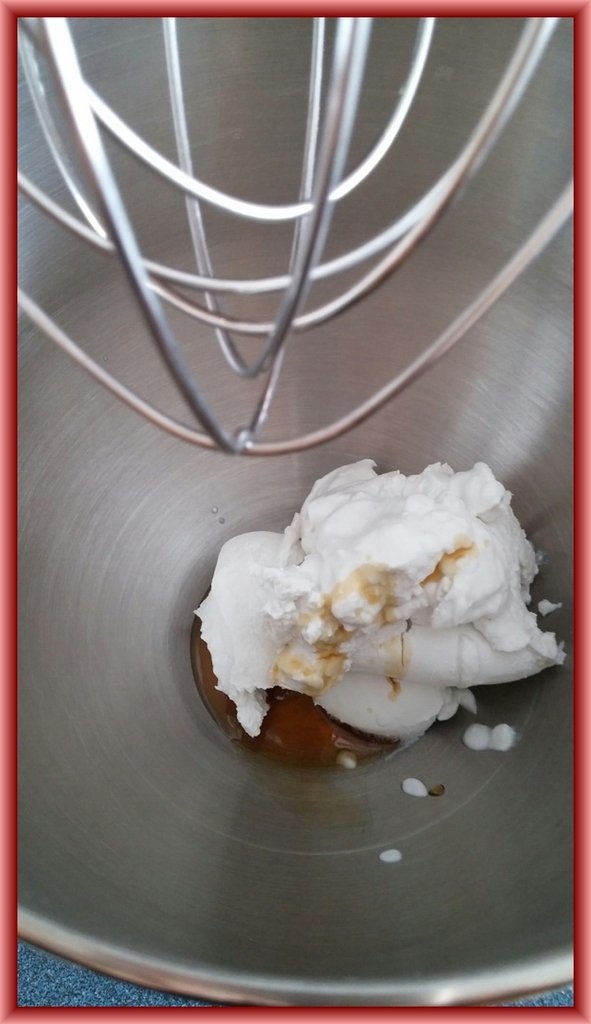
Whip at high speed for approximately 3 minutes.
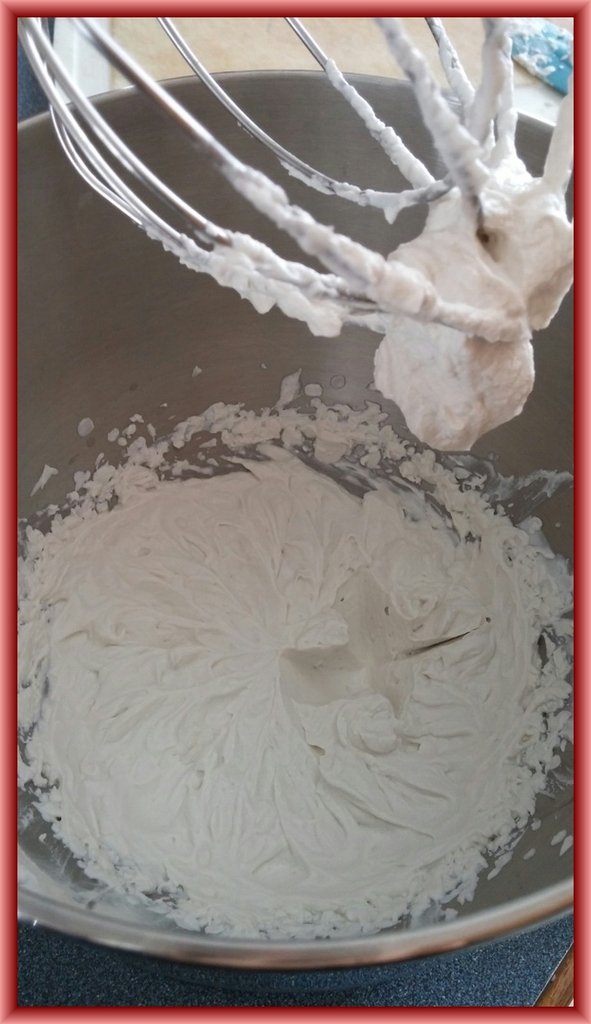
You'll notice that the whip cream is thick and spreadable. It can be used in any recipe that requires whipped cream.
It makes an excellent dessert topping and can be blended with other ingredients to make a light and creamy filling for squares or tarts.
It will keep for 7 days in a refrigerator.
I welcome your comments and invite you to follow me on my journey.
~ Rebecca Ryan
Hello @rebeccaryan,
Congratulations! Your post has been chosen by the communities of SteemTrail as one of our top picks today.
Also, as a selection for being a top pick today, you have been awarded a TRAIL token for your participation on our innovative platform...STEEM.
Please visit SteemTrail to get instructions on how to claim your TRAIL token today.
If you wish to learn more about receiving additional TRAIL tokens and SteemTrail, stop by and chat with us.
Happy TRAIL!

Thank you so much! I really appreciate the support. :)
You're 100% right. Though, the problem isn't that fats are good and carbs are bad. Both fats and carbs provide energy we can use. The problem is we're not using the energy provided by the carbs we're consuming, so the body produces insulin to store it away.
With the presence of this insulin, our bodies have been designed to see that as an indicator that it's a time of plenty, and engages a mode of operation that shuts down the body's repair and maintenance operations (I like to think of it as lazy mode).
When our body's insulin levels drop, it engages the ketosis cycle (ketosis is self-regulated by the presence of insulin), which provides access to the energy we have just stored as fat.
There's a lot of evangelism about paleo, banting, atkins and lchf, with the various proponents extolling the virtues of each, but at the end of the day as long as we're regularly switching between ketosis and glycolysis, the body is going to have the opportunity to maintain itself at regular intervals.
It's when we keep our bodies are in full time glycolysis (as we have been trained to do by modern society) that we really start having long term serious problems.
The funny thing is that you don't even have to eat any fats, or go on any special diets as long as you stop eating carbs long enough to engage ketosis regularly. This is what we call intermittent fasting, and can be as simple as not eating after a certain time each day, and before a certain time the next morning.
Of course the body is designed so that it performs better in ketosis, so if you can, that's probably the most beneficial way to live your life and I highly recommend it. Keto forever!!!
If you think about it, it makes sense from a biological standpoint. When we're in ketosis, we're generally going to need to go hunt/gather soon to collect more food, so we need all our faculties firing on all pistons. And when we have plenty of carbs, it's time to sit back and relax, party time, excellent.
Ultimately, it doesn't matter how you decide to eat to achieve this goal. I prefer the rather broad LCHF style which basically says: “Reduce your carbs, increase your fats, but eat whatever you want/can, whenever you feel like you need to.”
It doesn't place any artificial limits on what you can/can't eat, just a guideline on the maximum carbs you limit yourself to, and minimum fat you should have each day. If you want to have something grainy/sweet/starchy, fine, just limit it within your daily allotment. If you stay within these guidelines, your body will stay in ketosis.
For a good read on why insulin affects the body's repair / maintenance mode, check our my story over in #paleo on how insulin affects us. It specifically addresses the dementia / Alzheimer's thing.
Cheers, and keto on.
Thank you for providing this information @triddin!
I have read your post related to "how insulin affects us" and it is spot on. I have upvoted it and am following you.
I live a ketogenic lifestyle and have been practicing it for 6 years.
I have used it, along with daily cannabis consumption to successful put an autoimmune disease called multiple sclerosis into remission. Cannabis is an adapotogenic herb.
I know first hand that when you start to pay attention to severely limiting sugar in all it's various forms, the tissue in the body will stop being damaged by the trauma caused from the rapid rise and fall of blood sugar and will heal. The pancreas, which is the organ that produces insulin has a threshold for how much insulin it can produce and over the course of a person's lifetime seems to start faltering as we reach 40 years old on a standard North American diet. This is not something that we see happening in every country universally but it becomes more prevalent in cultures that consume high amounts of sugar.
In Ecuador, for example, we see this metabolic syndrome at work due to their huge consumption of beans, rice and plantains.
In the Middle East, they have a type II diabetic epidemic because of their population's huge "date" consumption.
In North America, it is due to all the highly refined, processed foods that we have at our disposal through the magic of our sterile grocery stores.
My general opinion is that learning how to fuel the body with the correct ratio of proteins, fats and sugars is "a" key to optimal health.
Fibre coming from plant matter, fats and proteins act like stabilizers for blood sugar. The goal being to reduce the amount of insulin that gets triggered to be released by the pancreas and the more efficient use of the caloric energy being consumed...meaning that we want the body to use the energy that it has consumed instead of storing it as visceral fat around its organs and mid-drift.
The other piece that should be discussed (because the 2 issues are intertwined) is the mix of bacterial flora in the gut. Often the bacteria mix in the gut gets "out of wack". The bacteria, yeast and fungi in the gut, feed off sugar. They can cross the blood brain barrier and they will demand to be feed. When a person craves sugar, it is my opinion that, it is the bacteria demanding to be feed which are triggering the urge to eat the sugar. Not the person's lack of will power.
Starving off specific strains of bacterial/yeast/fungus by cutting their sugar supply is another "key" to achieving optimal health.
Thanks again for taking the time to comment. I think the discussion is a great topic and it's valuable information for anyone who may decide to read the thread. :)
Happy New Year!
Happy new year to you too!
It's always a pleasure meeting another keto success story; I'm really pleased to hear about your MS remission, and I must say (hopefully in a non-creepy way) you look amazing and healthy in your photos. It's always a little treat to me whenever I see photos of someone who's been doing keto ‘right’ for a while, that they always have the same look of health and vibrancy about them.
I hope once my wife and I've been doing it for a while that we get the same look. It's only been about 2 months for us but I can already see the changes happening in her, and even my 16 yo son who was getting chubby is looking better.
You're also so right about the bacterial flora in the gut. @reddust has put me onto homemade sauerkraut and I have my first batch fermenting as we speak, and I'll be making some homemade kimchi today.
I've followed you and look forward to reading more of your stuff and perhaps seeing some of your keto recipes pop up on #paleo!
Keto on!
Happy New Year to you and yours @triddin!
I am pleased to meet you.
Not that I was making these changes for weight loss, but my husband lost 50 lbs and I lost 40 lbs. I'm only 5 feet tall, so that in itself was a huge transformation (pun totally intended).
Once I got the inflammation under control, I was able to turn my entire life around.
I don't even look like the same person.
Before I went Paleo, I felt sick fat and almost dead.
Now I am a force to be reckoned with and it sounds like you are too. :)
That's the other thing that really surprised me, is the speed at which the changes start taking effect. For me at least it was almost an immediate effect, within 3 days I knew this was for me, and that's actually pretty lucky cause week 3 totally sucked, we both got a cold or something while going through keto flu... yuk, but we persevered anyhow.
My wife keeps needing new clothes, it's funny because she feels guilty, but I just tell here I'd rather be buying clothes than paying for an early funeral.
This is so true.
I often tell people who are sitting on the fence about trying Paleo for the first time, that it will take 3 days and then they will start to feel an improvement in their bodies. Of course they don't believe me, but I just tell them, pick 3 days consecutively, don't eat any refined sugar, bread, pasta or rice. Then, on day 4 have a piece of toast and you'll feel your symptoms return. Usually once they experience a positive health change it is that motivation which drives them to keep going.
It usually takes about 8 month for the body's weight to stabilize to the ideal weight for that particular body. I usually ask people how much they weighed when they were 18 years old. This is the bottom range for what their weight should re-calibrate to. Add 10 pounds to that, and that becomes the top range. Until they reach their range, I usually advise that they should shop "thrift" stores for their jeans because they will motor through waist sizes.
It sounds like you and your wife are right on target.
Men typically re-calibrate faster, so please don't let your wife get discouraged if she is comparing her results to yours. ;)
Fantastic post
Thank you @gringalicious!
Hiya. There's a new Paleo trail. So add in a Paleo tag!
Thanks @kiwideb!
at the moment, paleo is more used than paleo-trail.
I think the lack of fat is one of the contributors to dementia, etc as well. But not many people are saying it.
Well, I'll say it...
Eat the highest fat you can find People!
Just don't eat grains grown in North America or refined sugar.
Yes!!
In North America, our wheat is sprayed with a chemical called glyphosate approximately 5 days before harvest. This chemical makes the plant think that it is dying and it will produce more wheat kernels. This drives the acre production volume up so that the farmers have more crops to sell. The problem is, that this same chemical, blows apart the intestinal tracts of insects and some how ? we think that it just magically disappears when it becomes ground and baked into a loaf of bread.
Just so I'm clear, it is damaging our gut lining too.
Grain grown and produced in my country has been poisoned, as far as I am concerned.
When I eat it, it makes me sick and I choose not to be sick. :)
Does this happen in your country @kiwideb?
Yes, it happens here too. It would be interesting to know how much of the problem with gluten grains is the glyphosate and how much is the gluten itself. And how much is lack of adaptation. A lot I think, for those of us who can't tolerate high levels of carbs generally.
I think (and this is my opinion only) that once the gut lining is healed from what is damaging it. People who don't have celiac disease can tolerate gluten.
The country of France banned all Monsanto products. Glysophate is a Monsanto product. The French don't seem to have the same health problems that people from other countries do. I think it's all in the chemical cocktails that we are ingesting through the food that we are producing.
Alzheimer's is often listed as type 3 diabetes.
https://www.ncbi.nlm.nih.gov/pmc/articles/PMC2769828/
I'm inclined to think that the disastrous effect of sugar(s) on the brain, nervous system and body generally, is a different action than that of not having enough saturated fat. But as they so often go together in the diet, it would be hard to differentiate.
On the other hand, I wonder if it's possible that sufficient saturated fat, and animal foods generally, would compensate for too much carbohydrate/sugar. To a certain extent anyway.
Then of course, there are other contributors like heavy metals, EMFs (especially cell phones), concussions...
We can actually make most of the fats we need for myelin sheaths and other tissues. But we make them best in the absence of high insulin. And we do need the fatty acids in our bloodstream to start with. It's a combined effect, I imagine.
Yes, I've long given up trying to pin things on just one variable!
This post has been ranked within the top 50 most undervalued posts in the second half of Dec 30. We estimate that this post is undervalued by $9.53 as compared to a scenario in which every voter had an equal say.
See the full rankings and details in The Daily Tribune: Dec 30 - Part II. You can also read about some of our methodology, data analysis and technical details in our initial post.
If you are the author and would prefer not to receive these comments, simply reply "Stop" to this comment.
Thank you.